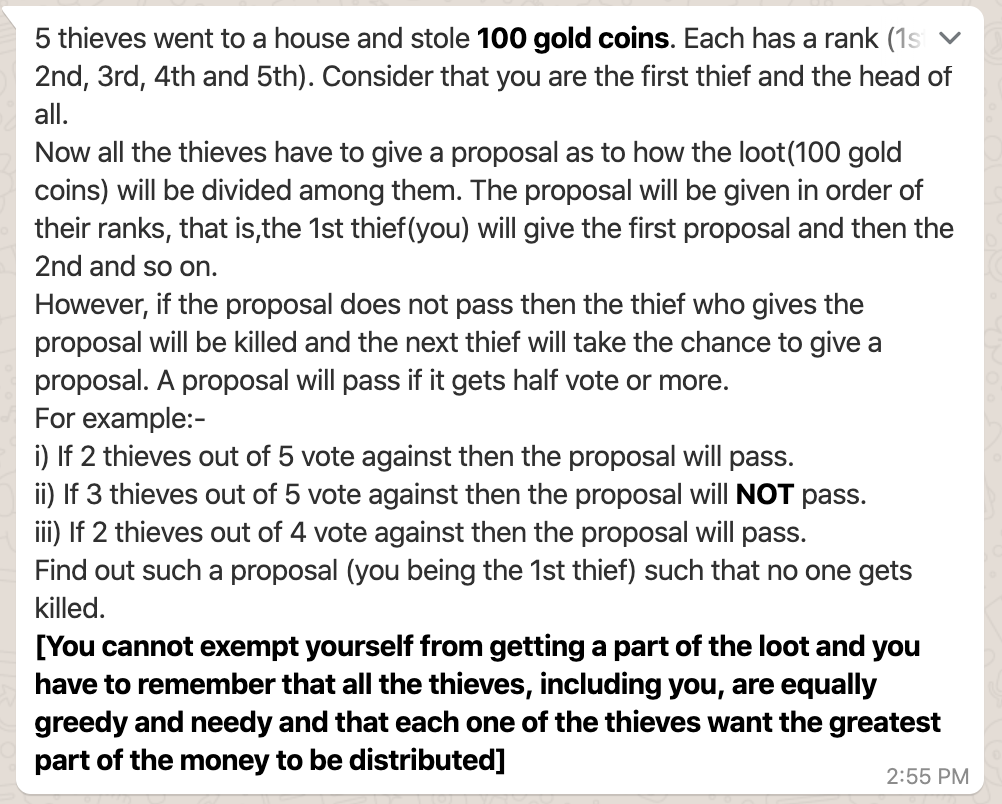27 May
2020
The nephews sent another interesting puzzle
I am getting a little worried that in all their puzzles, somebody or the other is getting killed (I think they are watching too much Bollywood) 🙂 , but the problems are interesting. I am attaching the Whatsapp screenshot here…

I would give coins to 33,33,33,1,0 to rank 1,2,3,4,5 respectively. Atleast 3 thrives will approve this. And so no one dies.
If I am second one, I should vote No, right? Then two more voting No (last and second last perhaps), means the first one gets nothing. Then I (second person) have a higher chance of getting more than 33 coins, right?
Hmm..
1) Given that no one should be killed, therefore the proposal of 1st thief should pass
2) Each thief thinks their fare share is 20, and will only approve the proposal if they think they are not being shafted or this is their best chance.
3) In your 98,0,0,1,1 proposal, I would think proposal will be rejected by all 4 thieves, thereby killing the first thief.
4) So, like your nephews, I am not convinced either.
Okay, let’s take the 98,0,0,1,1 scenario. Why would #5 ever vote against it. Only if he thinks he has a possibility to get more than 1, right? Does he?
Ok, I see your point. Clever
My nephews or me? 🙂
In the order of ranks, distribute 32, 34, 34, 0, 0 gold coins.
Harmindar, I would say the same thing as my reply to Nidhi.
Rajibda, I think it will be 98,0,1,1,0.
Somnath, I think that should be a solution. I think 98,0,0,1,1 should be a solution too. But my nephew is debating me on that. What do you think?
Answer posted: https://www.rajibroy.com/?p=21439
Nidhi, Somnath and Harmindar, see if the logic makes sense.
Rajib, I differ on the following two cases (agreeing to other initial cases as described in your solution) :
Case C: When only thieves are #2, #3, #4 and #5, then #2 needs only 1 vote other than his own to succeed.
Hence #2 will keep 99 coins to himself and has to give only one coin to either of #4 or #5, but not to #3, since if 1 coin is given to #5, he can vote either way since if #2 loses in voting, #5 is still guaranteed 1 coin in the plan by #3 after #2 is killed (as described in your solution). Hence plan of #2 should be 99,0,1,0
Case D: When all the five of the thieves are there, namely #1, #2, #3, #4 and #5, then #1’s plan should be to gain 2 votes other than his own to succeed, thus needing to give only 1 coin each to two of the remaining four.
#1’s plan should be 98,0,1,0,1 since if plan by #1 is either 98,0,1,1,0 or 98,0,0,1,1; then #4 can vote either way making no difference to him if #1’s plan fails as he is guaranteed 1 coin when only #2,#3,#4 and #5 remain as described in Case A above.
In general, to succeed in the voting, plan should be (total coins less votes needed from the others [,0[,1[,0[,1[,0[,1 …..]); meaning alternating between 0 and 1 for the tail of the sequence that is headed by the planner.
Harmindar,
I think I understand where you are differing. Your point is (in Case C) – if 5 is given one coin, he might still vote against the plan – in spite of knowing that he has reached his objective function since he has nothing to lose.
My way of thinking was once one has reached their objective function, they will vote for the plan. The ones that have not reached their objective function will vote against.
Does your way of reasoning hold for large numbers? Leet’s say, there were 100 thieves. If the answer is alternate, then #100 is offered nothing. But #99 is offered 1. But going by your original point, #99 can still vote against, right?
No, #99 will not vote against as in the next plan he will get nothing.
If a plan fails due to a voter who got a coin in that plan votes against the plan, in the next plan only the immediate follower of the head of the sequence gets benefited and none of the rest of the beneficiaries of the plan will be benefits in the next plan and hence won’t vote against the plan.
Sorry, my previous explanation is not completely accurate. As the plans alternates the beneficiaries, anyone getting benefited by a plan will not get benefited in the next plan and hence will not vote against any plan benefiting him.
Makes sense to me.